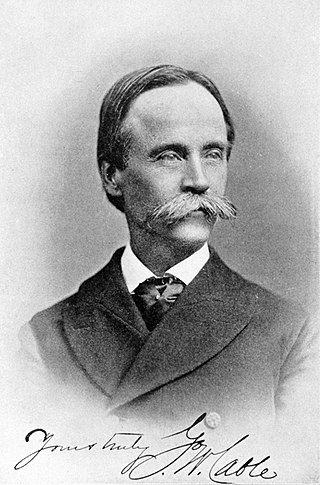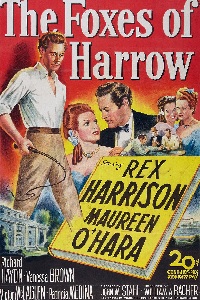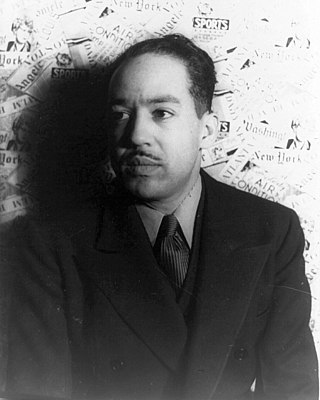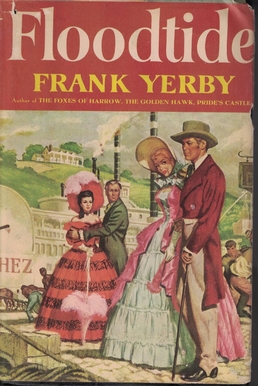
Paul Laurence Dunbar was an American poet, novelist, and short story writer of the late 19th and early 20th centuries. Born in Dayton, Ohio, to parents who had been enslaved in Kentucky before the American Civil War, Dunbar began writing stories and verse when he was a child. He published his first poems at the age of 16 in a Dayton newspaper, and served as president of his high school's literary society.

Walker Percy, OblSB was an American writer whose interests included philosophy and semiotics. Percy is noted for his philosophical novels set in and around New Orleans; his first, The Moviegoer, won the National Book Award for Fiction.

James Arthur Baldwin was an American writer and civil rights activist who garnered acclaim for his essays, novels, plays, and poems. His 1953 novel Go Tell It on the Mountain has been ranked among the best English-language novels. His 1955 essay collection Notes of a Native Son helped establish his reputation as a voice for human equality. Baldwin was a well-known public figure and orator, especially during the civil rights movement in the United States.
This article contains information about the literary events and publications of 1991.

Margaret Walker was an American poet and writer. She was part of the African-American literary movement in Chicago, known as the Chicago Black Renaissance. Her notable works include For My People (1942) which won the Yale Series of Younger Poets Competition, and the novel Jubilee (1966), set in the South during the American Civil War.

Frank Garvin Yerby was an American writer, best known for his 1946 historical novel The Foxes of Harrow.

George Washington Cable was an American novelist notable for the realism of his portrayals of Creole life in his native New Orleans, Louisiana. He has been called "the most important southern artist working in the late 19th century", as well as "the first modern Southern writer." In his treatment of racism, mixed-race families and miscegenation, his fiction has been thought to anticipate that of William Faulkner.

Southern United States literature consists of American literature written about the Southern United States or by writers from the region. Literature written about the American South first began during the colonial era, and developed significantly during and after the period of slavery in the United States. Traditional historiography of Southern United States literature emphasized a unifying history of the region; the significance of family in the South's culture, a sense of community and the role of the individual, justice, the dominance of Christianity and the positive and negative impacts of religion, racial tensions, social class and the usage of local dialects. However, in recent decades, the scholarship of the New Southern Studies has decentralized these conventional tropes in favor of a more geographically, politically, and ideologically expansive "South" or "Souths".

Jean Toomer was an American poet and novelist commonly associated with the Harlem Renaissance, though he actively resisted the association, and with modernism. His reputation stems from his novel Cane (1923), which Toomer wrote during and after a stint as a school principal at a black school in rural Sparta, Georgia. The novel intertwines the stories of six women and includes an apparently autobiographical thread; sociologist Charles S. Johnson called it "the most astonishingly brilliant beginning of any Negro writer of his generation". He resisted being classified as a Negro writer, as he identified as "American". For more than a decade Toomer was an influential follower and representative of the pioneering spiritual teacher G.I. Gurdjieff. Later in life he took up Quakerism.

The Foxes of Harrow is a 1947 American adventure film directed by John M. Stahl. The film stars Rex Harrison, Maureen O'Hara, and Richard Haydn. It is based on the novel of the same name by Frank Yerby, the sixth best-selling novel in the US in 1946.

James Mercer Langston Hughes was an American poet, social activist, novelist, playwright, and columnist from Joplin, Missouri. One of the earliest innovators of the literary art form called jazz poetry, Hughes is best known as a leader of the Harlem Renaissance. He famously wrote about the period that "the Negro was in vogue", which was later paraphrased as "when Harlem was in vogue."

Emma Augusta Sharkey was a 19th-century American writer, journalist, dime novelist, and story-teller from New York. Known as Mrs. E. Burke Collins in the literary world, she wrote for the press and was one of the small group of women writers of her era who earned more than US$6,000 a year with their writing. As with Sarah Elizabeth Forbush Downs, Sharkey used a married name as a pseudonym.

Jeannette H. Walworth was an American novelist and journalist. Born in Philadelphia, in 1837, she removed to Natchez, Mississippi, while a child, with her father, Charles Julius Hadermann, a German baron, who became the president of Jefferson College. On his death, the family removed to Louisiana. When she was sixteen years old, Walworth became a governess. In 1873, having married Maj. Douglas Walworth, of Natchez, she accompanied him to his plantation in southern Arkansas, and then to Memphis, Tennessee, before finally removing to New York City. In addition to contributions to the periodical press, the Continent, The Commercial Appeal, and other magazines, she published several novels. Walworth died in 1918.

Pride's Castle is a 1949 historical novel by the American writer Frank Yerby. It was ranked ninth on the Publishers Weekly list of bestselling novels that year. Like many of his books it is set in nineteenth-century America. Although it was his first novel set in the North, the protagonist is a Southerner. It was adapted as an episode of the The Philco Television Playhouse that aired on NBC in September 1949, with Anthony Quinn, Catherine McLeod and Louise Allbritton in the cast.

Fairoaks is a 1957 historical novel by the American writer Frank Yerby. It was one of his better critically received works of the 1950s, at a time when his reputation amongst reviewers had been declining despite his popularity with readers.

Bride of Liberty is a 1954 historical novel by the American writer Frank Yerby. Along with Benton's Row it was received by critics as "third-rate pulp fiction", as part of a general downturn in the reputation of Yerby's novels. It also did not feature on the Publishers Weekly list of bestselling novels which Yerby's works had regularly appeared over the previous few years. It was originally written by Yerby for his own children.

The Devil's Laughter is a 1953 historical adventure novel by the American writer Frank Yerby. One reviewer described it as having "more dazzle than depth". It is set in Europe of the late eighteenth century in contrast to Yerby's more usual setting of nineteenth century America.

Floodtide is a 1950 historical novel by the American writer Frank Yerby. It was ranked seventh on the Publishers Weekly list of bestselling novels that year. Like many of his works of the era it is set in the South during the nineteenth century.

The Vixens is a 1947 historical novel by the American writer Frank Yerby. It was his second published novel and like the first, The Foxes of Harrow, to which it was a sequel it was a commercial success and was ranked fifth on the Publishers Weekly list of bestselling novels that year. Yerby himself disliked the book and later described it as his worst novel.

The Golden Hawk is a 1948 historical novel by the American writer Frank Yerby. It was his third published novel, and was a popular success ranking sixth on the Publishers Weekly list of bestselling novels that year.



















